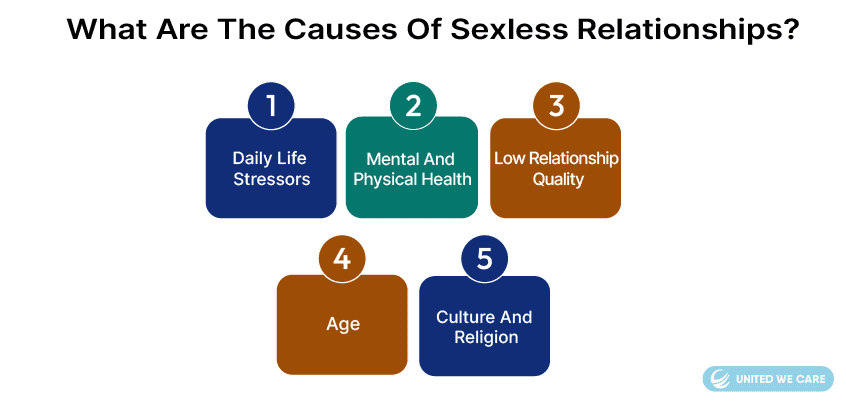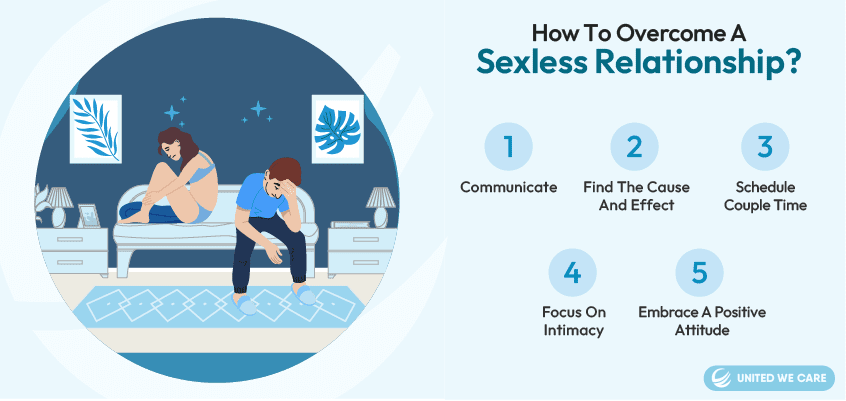Introduction
We live in a sex-obsessed world. Everything from movies, to songs, to jokes, revolve around sex and sexuality. In such a world, being a couple who is not having sex frequently can make you feel confused, sad, and abnormal. Sexlessness in a relationship can become a concern for you and your partner. If you are a person struggling with this confusion and wondering what to do, then this article will help you. Here we are going to unravel the causes and effects of sexless relationships along with what you can do to overcome it.
What is a Sexless Relationship?
Sex is considered a form of physically intimate act in relationships. A sexless relationship is one where the partners have not been engaging in sex or engaging in minimal amount of sex [1]. While some consider a relationship to be sexless if partners have sex less than 10 times a year, most experts agree that there cannot be a common marker for this metric as the amount of ideal sex varies from person to person [1].
In the past, surveys and research have shown that sexless relationships are quite common. For example, one US survey revealed that 14% of men and 10% of women had not had sexual contact in the past year [2]. In another study conducted in Australia, researchers found that 54% of married men and 27% of married women were dissatisfied with the frequency of sex, and while this contributed to their relationship dissatisfaction but was not the only predictor [3].
However, if you and your partner are having less than usual sex, but you both are happy with how things are, you may not need to worry about it. Sexlessness becomes a worry only when either one of you is in this situation involuntarily. That is you have the desire for sex but are unable to engage in it.
What are the Causes of Sexless Relationships?
Before understanding how sexlessness in relationships affects a couple, it is essential to understand what can cause it in the first place. Some common reasons for sexless relationships include [1] [2] [4]:

- Daily Life Stressors: In many cases, partners just don’t have enough mental, physical, or emotional bandwidth for sex. Paying bills, work stress, daily chores, looking after kids, and managing different demands of life become so exhausting that sex takes a backseat.
- Mental and Physical Health: A physical health condition, especially a chronic condition like diabetes or chronic pain, makes it difficult for partners to have sex. Further, mental health conditions like depression or anxiety and medications can affect a person’s sex drive, and overall sexual activity decreases.
- Low Relationship Quality: If a relationship is riddled with conflicts and is not strong, the chances of it being sexless will increase, for in these situations, sex will feel like a chore or obligation.
- Age: While not all older adults have sexless relationships, many older men and women are in relationships where sex is not frequent. However, the dissatisfaction with the absence of sex is also comparatively lower than younger adults, for they expect themselves to be celibate at an older age.
- Culture and Religion: A person’s culture, country, and religious beliefs can also contribute to sexlessness in relationships. For instance, data shows that Asians, specifically Japanese people have the least sex across the world. In contrast, Europeans, specifically Greeks, have the most sexual encounters in a year [5]. The reason is that Europe’s culture is more sexually liberal. Further, religious beliefs also affect how much a person considers sex to be normal and acceptable. In some religions, sex is looked down upon or is accepted only as a tool to reproduce.
Must read Erotophobia- Fear of Intimacy
What are the Effects of Sexless Relationships?
If you are already struggling with minimal or lack of sex in your relationship, you might have noticed that it comes with some significant negative effects. Commonly sexless relationships can cause [3] [4] [6]:
- Lowered Sexual Satisfaction: Lack of sexual intimacy can lead to loss of attraction towards the partner. Sex itself can become a sensitive topic, and the partners might genuinely lose their sexual drive. This can cause frustration, guilt, and other negative feelings.
- Lowered Relationship Satisfaction: Overall intimacy in a relationship, whether it is around open communication or emotional intimacy, may be reduced. Negative attitudes towards the partner can develop along with frequent conflicts with each other.
- Infidelity: A sexless relationship is not the only cause of cheating among partners but can contribute to one or both of the partners having flings or casual sex outside of the dyad.
- Negative Effects on Mental Health: Lack of sexual activity with one’s partner can also lead to negative feelings towards self, low self-esteem, feelings of rejection and insecurity, frustration, and depressed mood.
More information about Sex Therapy Exercise
How to Overcome a Sexless Relationship?
It can be hard to deal with these negative effects, and pressure to overcome the situation as soon as possible may develop. But this is the time to pause and reflect. The first step is to determine whether or not it is a concern for you and your partner. If it really is bothering you both, then you need to come together and jointly find solutions that work for you. Some tips that can help in this are [1] [7] [8]:

- Communicate: You have to communicate your concerns. Communication is key in any relationship, but if you have been facing issues, it becomes more important to open up space and initiate conversations about your worries with your partner. If communication itself is an issue, then you can work on finding and practicing strategies for communication and create rules or protocols that you both will follow to share with each other openly.
- Find the Cause and Effect: It is important to understand when your relationship turned sexless and what are the contributing factors to it. Further, you need also to find out how it is currently impacting you. Once both cause and effect are clear, the two of you can move to find solutions.
- Schedule Couple Time: Since time is a constraint for many partners in the modern world, it might be useful to actually schedule dates and other time slots where you and your partner can spend time together. Scheduling sex might also help. Here, sex could include anything ranging from exploring new products to just foreplay and physical intimacy.
- Focus on Intimacy: Many times, sex becomes a pressure, and intimacy takes a backseat. It is important to work on the overall intimacy of the relationship. This includes physical intimacy, emotional intimacy, intellectual intimacy, social intimacy, and spiritual intimacy.
- Consider Therapy: It can get challenging to navigate these issues by oneself, especially if the underlying relationship has problems from the past. Sex therapy or couples therapy can help in this regard.
Read more about -How does a Sex counselor help you.
Conclusion
Sexless relationships are relationships where sex is minimal or absent. They can cause a lot of distress, shame, and conflict if either you or your partner are unhappy with the frequency of sex and feel like you have been trapped in a sexless relationship. Nonetheless, if both of you are ready to communicate, find solutions, and work on the relationship, you can overcome this issue easily. Additionally, you can also consider reaching out to our experts at United We Care. At United We Care, we have a team of dedicated professionals who are well-equipped to help you and your partner navigate such relationship challenges.
References
[1] J. Brito, “Sexless marriage or relationship: What causes it and how to fix I,” Healthline, https://www.healthline.com/health/healthy-sex/sexless-marriage (accessed Jul. 26, 2023).
[2] D. Donnelly, E. Burgess, S. Anderson, R. Davis, and J. Dillard, “Involuntary celibacy: A life course analysis,” The Journal of Sex Research, vol. 38, no. 2, pp. 159–169, 2001. doi:10.1080/00224490109552083
[3] A. Smith et al., “Sexual and relationship satisfaction among heterosexual men and women: The importance of desired frequency of sex,” Journal of Sex & Marital Therapy, vol. 37, no. 2, pp. 104–115, 2011. doi:10.1080/0092623x.2011.560531
[4] D. A. Donnelly and E. O. Burgess, “The decision to remain in an involuntarily celibate relationship,” Journal of Marriage and Family, vol. 70, no. 2, pp. 519–535, 2008. doi:10.1111/j.1741-3737.2008.00498.x
[5] G. Igusa, “Data analysis of sexless relationships to determine the effects of factors like relationship quality and number of vacation days,” 松山大学論集 = MATSUYAMA UNIVERSITY REVIEW 32 (3), 25-37, 2020-08-01, 2020. [Online]. Available: https://matsuyama-u-r.repo.nii.ac.jp/?action=repository_action_common_download&item_id=2842&item_no=1&attribute_id=22&file_no=1
[6] A. Chaudhary, Dr. A. Bhonsle, and A. T. A. ChaudharyJournalist, “9 sexless relationship effects no one talks about,” Bonobology.com, https://www.bonobology.com/sexless-relationship-effects/ (accessed Jul. 26, 2023).
[7] K. Gonsalves, “All your questions about sexless relationships, answered by sex therapists,” mindbodygreen, https://www.mindbodygreen.com/articles/sexless-relationships-causes-and-how-to-fix (accessed Jul. 26, 2023).
[8] K. Panganiban, “Sexless marriage: 8 causes & tips to deal with it,” Choosing Therapy, https://www.choosingtherapy.com/sexless-marriage/ (accessed Jul. 26, 2023).










